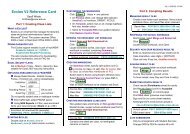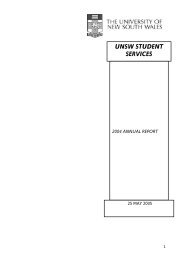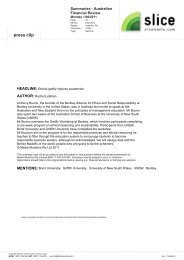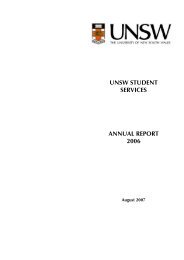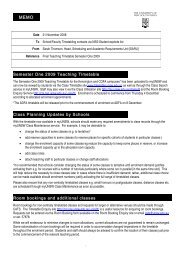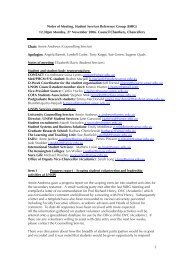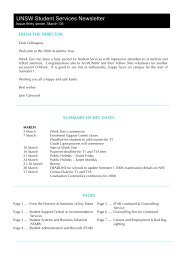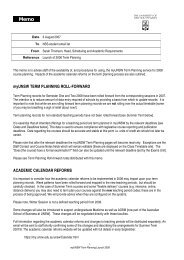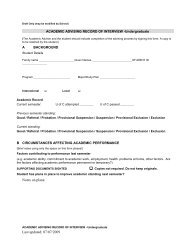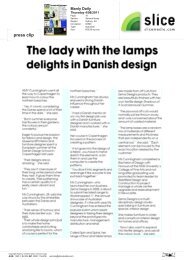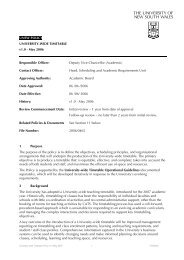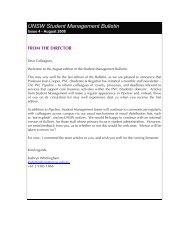UNSW Student Services Newsletter - myUNSW
UNSW Student Services Newsletter - myUNSW
UNSW Student Services Newsletter - myUNSW
You also want an ePaper? Increase the reach of your titles
YUMPU automatically turns print PDFs into web optimized ePapers that Google loves.
<strong>UNSW</strong> <strong>Student</strong> <strong>Services</strong> <strong>Newsletter</strong><br />
issue ten, september 05<br />
<strong>UNSW</strong><br />
<strong>Student</strong><br />
<strong>Services</strong><br />
From the Director<br />
Dear Colleagues<br />
I am pleased to advise that the review of <strong>UNSW</strong> <strong>Student</strong> <strong>Services</strong> is almost complete. The Housing Office is<br />
the only area still under review; a proposal is under consideration to dismantle the current office and reinstate<br />
a Housing Office (self-care apartments and accommodation services) separate from the administration of the<br />
Kensington Colleges. This should be finalised by the end of September.<br />
The new structure of <strong>Student</strong> <strong>Services</strong> is provided on page 2 and incorporates 6 areas. Careers &<br />
Employment and the Counselling Service have not changed, and are headed by Lene Jensen and Annie<br />
Andrews respectively. The principal changes to structure are in the student and academic ‘administration’<br />
areas:<br />
<strong>Student</strong> Support Central<br />
Deputy Director: Kathryn Whittingham kwhittingham@unsw.edu.au . This area has 3 offices: Scholarships<br />
and Financial Support, <strong>Student</strong> Central and Admission <strong>Services</strong>. The functional areas are described at<br />
https://my.unsw.edu.au/student/Staff/OrgChartSSC.pdf<br />
<strong>Student</strong> Administration and Records<br />
Deputy Director: Kathy Keane k.keane@unsw.edu.au . This area has adopted a new team approach which is<br />
set out at https://my.unsw.edu.au/student/Staff/OrgChartSTAR.pdf and incorporates Enrolments, Examinations,<br />
Graduations, Protocol, Academic Records, Commonwealth Support and Fees.<br />
<strong>Student</strong> Systems and Business Solutions<br />
Deputy Director: Robert Morrell r.morrell@unsw.edu.au. This area is set out at<br />
https://my.unsw.edu.au/student/Staff/OrgChartSSABS.pdf and incorporates <strong>Student</strong> Systems, <strong>Student</strong><br />
Publications and Communication and Business Solutions<br />
Following the creation of the Graduate Research School and the resulting transfer of staff from Scholarships,<br />
Loans and Research <strong>Student</strong>s Office (SLARSO) there are some vacant positions which we are in the process of<br />
filling. We have also launched an intensive team building and training program to equip our staff for the<br />
challenges ahead. Please don’t hesitate to contact me or the Deputy Directors if you would like further<br />
details on the restructure, or have enquiries about the department.<br />
Best wishes<br />
Jane Gatwood<br />
INDEX<br />
Page 1 …… From the Director<br />
Page 2 …… <strong>Student</strong> <strong>Services</strong> Organisational Chart<br />
Page 3 …… <strong>Student</strong> Support Central<br />
Careers & Employment<br />
Page 4 …… <strong>Student</strong> Systems & Business Solutions<br />
Charbel’s Corner<br />
Page 5 …… Housing Office<br />
<strong>Student</strong> Administration and Records (STAR)<br />
Page 6 …… STAR continued<br />
Counselling Service<br />
Page 7 …… Counselling Service continued<br />
To receive the <strong>UNSW</strong> <strong>Student</strong> <strong>Services</strong><br />
<strong>Newsletter</strong>, please email<br />
unswstudentservices@unsw.edu.au
<strong>UNSW</strong> <strong>Student</strong> <strong>Services</strong> <strong>Newsletter</strong>, issue ten Page 2 of 7<br />
<strong>UNSW</strong> <strong>Student</strong> <strong>Services</strong><br />
Organisational Model<br />
Effective September 2005<br />
DIRECTOR<br />
Executive Assistant<br />
Financial Officer<br />
STUDENT<br />
SUPPORT CENTRAL<br />
CAREERS &<br />
EMPLOYMENT<br />
STUDENT<br />
ADMINISTRATION<br />
AND RECORDS<br />
STUDENT SYSTEMS<br />
& BUSINESS<br />
SOLUTIONS<br />
COUNSELLING<br />
HOUSING OFFICE<br />
Admissions<br />
Scholarships and Financial<br />
Support (SAFS)<br />
[Scholarships, AusAID, Prizes<br />
and Loans]<br />
ESOS<br />
<strong>UNSW</strong> <strong>Student</strong> Central<br />
Enrolments<br />
Examinations<br />
Records<br />
Academic Progression<br />
Commonwealth Support and Fees<br />
Protocol<br />
Graduations<br />
NewSouth <strong>Student</strong><br />
my<strong>UNSW</strong> <strong>Student</strong> Portal<br />
Systems – User Education, Support and<br />
Documentation<br />
Timetabling and Academic Requirements<br />
Handbooks<br />
<strong>Student</strong> Publications and Communications
<strong>UNSW</strong> <strong>Student</strong> <strong>Services</strong> <strong>Newsletter</strong>, issue ten Page 3 of 7<br />
STUDENT SUPPORT CENTRAL<br />
Admissions<br />
Well folks, it may only seem like yesterday that we welcomed new students to the University for 2005, but we are<br />
about to kick off another round of UAC Admissions in earnest. UAC applications opened on 4 August and the first<br />
'on-time' closing date is Friday, 30 September. Thereafter, potential students may lodge an application subject to a<br />
late fee. The UAC Admissions Office will be producing and distributing Preference Statistics following various<br />
closing dates.<br />
The Direct Admissions team continues to receive and process applications for all Postgraduate Coursework and<br />
Undergraduate International admissions for Semester 1, 2006 and beyond. The team will commence distribution of<br />
summary data to members of VCAC and others from October onwards. In the meantime, Sally Kwan has been<br />
seconded full-time to work on the <strong>UNSW</strong> Asia project for Admissions, and will relinquish her role as one of the Team<br />
Leaders. Therefore, if you have any general policy or procedural questions relating to Direct Admissions, please<br />
direct them to Julie Groth j.groth@unsw.edu.au<br />
Scholarships & Financial Support (SAFS)<br />
The newly formed team of Scholarships & Financial Support currently has a number of key vacancies. Please be<br />
patient with us while we complete the team and define our roles. Representatives from both the Admissions Office<br />
and SAFS will be available on Courses & Careers Day on Saturday, 3 September to answer questions from potential<br />
students.<br />
<strong>Student</strong> Central<br />
We are pleased to announce that the new position of Head, <strong>Student</strong> Central has been filled by Clare Buckley, who<br />
joins us from the University of Manchester in the UK, where she managed the establishment of a student centre,<br />
following the University's merger with UMIST. Clare starts at <strong>Student</strong> Central on Monday 5 September and will<br />
spend time getting to know her colleagues, including those in similar roles in Faculties, before she embarks on the<br />
development of <strong>Student</strong> Central as the primary focus for students to enquire about <strong>Student</strong> <strong>Services</strong>.<br />
CAREERS & EMPLOYMENT<br />
Alumni DVD<br />
Careers & Employment recently produced a <strong>UNSW</strong> alumni DVD in collaboration with students from the School of<br />
Media, Film and Theatre. The project was managed by Careers Consultant, Kate Trotter, and tells the stories of eight<br />
alumni from various Faculties who are now working in exciting and interesting careers that they love. It will be<br />
shown to prospective students at Courses & Careers Day ‘05.<br />
Accounting Workshop<br />
Taye Morris recently ran a special event workshop: Applying for 2006 Accounting Jobs. The workshop featured a<br />
panel discussion with three current students who have been successful in securing graduate positions with Big 4<br />
Accounting firms. Fiona Zhou, Kevin Chong and Jim Yang kindly gave up their time to talk openly about the graduate<br />
recruitment experience and offered valuable tips and advice from the student perspective.<br />
Mock Interviews<br />
Careers & Employment launched a new Mock Interview service in August. It offers students a one-to-one opportunity<br />
to practice their interview skills and to receive feedback on their performance from Careers Consultants. The new<br />
service has been very popular; sessions are full within 10 minutes of opening for registrations. More sessions will be<br />
offered in September to meet demand. Feedback from a satisfied student “I would just like to thank you for the time<br />
you took to help me with my interviewing skills. I have learned much from the experience and hope to put it into<br />
practice when the real test comes around.”<br />
Interview skills for Law students<br />
Careers & Employment was invited by the <strong>UNSW</strong> Law Society to chair a panel of HR representatives and two <strong>UNSW</strong><br />
Law graduates from Deacons and Gilbert and Tobin. Approximately 60 students attended the seminar and were able<br />
to ask questions and gain advice on preparing for law clerkship interviews. A particularly unpredictable question was<br />
asked of a law student a few years ago, “If you were a piece of fruit how would you prevent yourself from being<br />
eaten”<br />
COFA Handy Hints Day<br />
Careers & Employment participated in the Handy Hints Day organised by the <strong>Student</strong> Association at COFA. We<br />
offered feedback on resumes; however, most students were seeking advice on how to secure either part-time or fulltime<br />
employment.
<strong>UNSW</strong> <strong>Student</strong> <strong>Services</strong> <strong>Newsletter</strong>, issue ten Page 4 of 7<br />
STUDENT SYSTEMS & BUSINESS SOLUTIONS (SSABS)<br />
Centralised Timetabling and Class Scheduling – An update<br />
The Academic Board has endorsed the establishment of a centralised teaching timetable from 2007 to<br />
support greater course choice for students, incorporate genuine staff needs and improve the utilisation of<br />
scarce space resources.<br />
A number of initiatives are in progress to prepare the way for this initiative. We are developing a new,<br />
streamlined set of services in the my<strong>UNSW</strong> Portal for staff in Schools. Staff will be able to manage courses<br />
and schedule and manage classes entirely within my<strong>UNSW</strong>.<br />
Class Scheduling will be released in October to coincide with the commencement of scheduling for Session<br />
1 and 2 classes. This service focuses on initial class set up for the coming semesters.<br />
Class Management will be released in December to coincide with the start of main semester enrolments.<br />
This service provides summary information, including status, capacities and enrolments for all classes in a<br />
course. It enables staff to monitor enrolment demand in real time, and adjust quotas and availability as<br />
required. It also allows classes to be closed and will notify students by email. There will also be a tool for<br />
transferring a group of students from one class to another in a course.<br />
Course catalogue maintenance and timetabling requirements management will be released in April 2006 to<br />
coincide with the commencement of publication and timetabling activities for 2007. This service will allow<br />
schools to specify their needs and requirements for classes to be scheduled in the new centralized timetabling<br />
solution. Data to be collected includes anticipated enrolments, room requirements, eLearning needs and staff<br />
availability.<br />
These services will be complemented by easy-access online help and enquiries, also provided through<br />
my<strong>UNSW</strong>. The first of these – a new Class Timetable website – will be released in October to coincide with<br />
the release of the 2006 Online Handbook. (<strong>Student</strong>s will also have access to this site which is tightly<br />
integrated with my<strong>UNSW</strong> and the Online Handbook.) When these services are implemented staff involved<br />
in course management, class scheduling and timetabling will be able to conduct all of their work through<br />
my<strong>UNSW</strong> without the need to access NewSouth <strong>Student</strong> through the ‘Citrix’ panels.<br />
In parallel with these developments we have been working with Faculties to assist them to set up all of their<br />
classes – lectures, tutorials and laboratories – in NewSouth <strong>Student</strong>. We expect around 85% of classes will<br />
be on NSS in 2006 which will enable us to provide a better enrolment service to students and a more<br />
complete schedule for academic staff. In addition, the class details will be re-used as a data baseline for<br />
2007 timetabling work.<br />
User education and support of class schedulers will be provided by SSABS – information will be sent out<br />
later in September. Details will also be included in the October newsletter. In the meantime, Sarah<br />
Thomson can answer any enquiries – s.thomson@unsw.edu.au.<br />
Opportunity knocks! There is a ground-floor, rarely-offered opportunity for School class schedulers to assist<br />
us with testing of the new class scheduling services. Testers will have early access to the new my<strong>UNSW</strong><br />
processes and can make a valuable contribution to the implementation of an exciting new service. Testers<br />
will also receive a complementary slice of cake (or equivalent!). Please contact Sarah<br />
s.thomson@unsw.edu.au if you can help.<br />
CHARBEL’S CORNER<br />
Online translation<br />
There are a few websites that offer online translations from various languages to English and vice versa, the<br />
most popular one being: http://babelfish.altavista.com. Google also offers online translations but with fewer<br />
language options: http://www.google.com/language_tools .<br />
You can enter a single word, a whole sentence or even a link to a webpage and have it translated. It is<br />
recommended to split long sentences into shorter ones before attempting to translate. Keep in mind that the<br />
translation tool is not perfect and can provide wrong translations … but it does come in handy sometimes!<br />
Charbel is the Web/Systems Administrator in Careers & Employment; he can be contacted at<br />
c.aghnatios@unsw.edu.au
<strong>UNSW</strong> <strong>Student</strong> <strong>Services</strong> <strong>Newsletter</strong>, issue ten Page 5 of 7<br />
HOUSING OFFICE<br />
Thanks to the efforts of Joe Touma, Facilities Supervisor at the <strong>UNSW</strong> Housing Office and to Gary Peacock from<br />
<strong>UNSW</strong> Facilities, arrangements are now in place to have the evacuation alarm system at the Kensington<br />
Colleges upgraded to cater for the needs of hearing impaired residents.<br />
The improvements will include the installation of a communication control unit that will be linked to the<br />
University’s centralised alarm monitoring system. In the event of the evacuation alarm system being activated,<br />
the system will immediately send out a message to the vibrating pages that will be issued to hearing impaired<br />
residents at the three Kensington Colleges.<br />
The system will be able to determine in which particular college the alarm has been activated and will only<br />
notify the hearing impaired residents in that particular college.<br />
STUDENT ADMINISTRATION AND RECORDS (STAR)<br />
Key Dates:<br />
Mon 5 Sept: Graduations commence<br />
Mon 19 Sept: Deadline for lodging exam papers to be printed<br />
Tue 4 Oct: Provisional exam timetable published<br />
Fri 25 Nov: Deadline for completion of students for December graduation ceremonies<br />
Academic Records<br />
As the census date (31 Augut) has now passed, we are busily processing many last-minute applications for<br />
Program Leave and Discontinuation. It would be appreciated if Schools and Faculties could forward these<br />
applications and any other pre-census enrolment variations to their Faculty contact in <strong>Student</strong> Administration<br />
and Records as soon as possible.<br />
Academic Standing<br />
Pending Academic Standing for Session 1, 2005 has now been finalised. All students who had a standing level<br />
of “Pending” have had their standing recalculated. If standing could still not be determined due to unresolved<br />
results, students were assigned their previous sessions standing.<br />
Examinations<br />
The new Examinations team has commenced timetabling end of session examinations for Semester 2, 2005. As<br />
timetabling is a complex process we regret to advise that it is now too late for Schools/Faculties to either vary<br />
examination details and/or request special scheduling arrangements.<br />
The provisional timetable will be published after the mid-session break on Tuesday 4 October.<br />
Please note that the deadline for lodging examination papers to be printed by Examinations is Monday 19<br />
September. This may seem unrealistically early, but the logistics of preparing, printing and distributing<br />
examination papers are such that the lead time is a necessity.<br />
During the Session 1, 2005 end of semester examinations it was a matter of concern that there was a marked<br />
increase in the number of corrections required to be made to papers during the examination. Eight separate<br />
corrections were required for one examination paper. The co-operation of Schools/Faculties is sought in<br />
relation to maintaining academic standards through appropriate proof reading of draft examination papers.<br />
Commencing in the Semester 2, 2005 end of session examinations, statistics on examination paper<br />
amendments will be collated and provided to Heads of Schools/Deans.<br />
For information about examinations or timetabling please contact Grant Walter (53086 or<br />
g.walter@unsw.edu.au )<br />
Commonwealth Support and Fees<br />
Following census date, the Commonwealth Support and Fees office is concentrating on keeping as many<br />
students as possible from cancellation of their enrolment for this semester! We will be turning our attention to<br />
the Commonwealth Assistance Notice (CAN) in a few weeks and students can access this online.<br />
The 2006 tuition fees and student contribution amounts have been finalised and published on the my<strong>UNSW</strong><br />
site. If you would like a copy of these please contact fees@unsw.edu.au.
<strong>UNSW</strong> <strong>Student</strong> <strong>Services</strong> <strong>Newsletter</strong>, issue ten Page 6 of 7<br />
STUDENT ADMINISTRATION AND RECORDS (STAR) continued<br />
Graduations<br />
Session 2 Graduation Ceremonies begin on Monday 5 September. The Session 2 Graduation Schedule can be<br />
found at: https://my.unsw.edu.au/student/academiclife/GraduationsScheduleS2final.pdf<br />
Potential Graduand Processing<br />
The deadline for processing potential graduand records for students to graduate in the September/October 2005<br />
ceremonies has now passed. <strong>Student</strong>s completed will only be added to September/October ceremonies if<br />
space is available and there is sufficient processing time prior to the ceremony.<br />
Most students completed late will be allocated to cross-Faculty December ceremonies. The processing deadline<br />
for inclusion in the December ceremonies is Friday 25 November.<br />
The identifier for potential graduands completing in Semester 2, 2005 (Term 5057) will be run in mid-<br />
September. Details will be mailed out via the nss-explode e-mail list.<br />
Graduation Information for students can be found at:<br />
https://my.unsw.edu.au/student/academiclife/graduations.html<br />
Academic Procession<br />
All academic staff are encouraged to join the academic procession for their Faculty ceremonies. An invitation<br />
to attend Session 2 Graduation Ceremonies was emailed to all academic staff in early August. The invitation<br />
can be found at:<br />
https://my.unsw.edu.au/student/academiclife/GraduationInvitationForAcademics.pdf<br />
If you wish to attend a ceremony, please ensure that you advise the Protocol Office. You can return the<br />
invitation by fax to ext 51588, or contact Mai-Lynda Jackson on ext 51152 or m.jackson@unsw.edu.au. A<br />
reminder email is sent to all procession members a few days prior to the ceremony, confirming time, venue and<br />
other details.<br />
Volunteering<br />
Volunteering at a graduation ceremony gives you the opportunity to participate in one of the happiest and most<br />
memorable occasions of a student’s life at <strong>UNSW</strong>. So why not get involved You only need to commit 1¼<br />
hours, and we provide a full briefing for all staff so that you know what you’re doing. You can choose from a<br />
range of jobs including meeting & greeting, seating assistance and registration. Contact Mai-Lynda Jackson on<br />
ext 51152 or m.jackson@unsw.edu.au to volunteer for one of the upcoming ceremonies.<br />
COUNSELLING SERVICE<br />
The Counselling Service has been working with the Marketing and Development Office to start organising for<br />
O-Week 2006. We are very excited to have the assistance and support of the MDO to keep working closely<br />
with the Union to provide a great orientation experience for our new students.<br />
Update: O-Week for Session 2:- correction of omission of fact and an apology.<br />
Last month’s newsletter contained an item about the orientation of commencing students in S2, 2005.<br />
Unfortunately one very important mention did not make it into the article. The Faculty of Engineering should<br />
have been mentioned as one of the Faculties providing a welcome and orientation program for commencing<br />
students. Apologies to all in the Faculty of Engineering for this omission.
<strong>UNSW</strong> <strong>Student</strong> <strong>Services</strong> <strong>Newsletter</strong>, issue ten Page 7 of 7<br />
COUNSELLING SERVICE continued<br />
We have compiled the O-Week survey responses from first year students, with about 20% of first years<br />
participating in the survey. Attendance at O-Week was fantastic this year, with over 88% of first year<br />
students attending, with age ranges from 16-60. 53% of students were in paid employment and 23% of<br />
students worked over 10 hours a week. <strong>Student</strong>s indicated that their biggest goals in attending O-Week were<br />
to get geographically oriented to <strong>UNSW</strong> and make lots of friends. A very pleasing result was that 79% of<br />
students reported that O-Week was useful or very useful for making them feel like a <strong>UNSW</strong> student. <strong>Student</strong>s<br />
who attended O-Week were much more satisfied with their transition to uni than students who did not<br />
attend.<br />
The open-ended questions in the survey provided lots of useful information. The responses from students are<br />
summarised below:<br />
What has helped most in your adjustment to uni (667 respondents)<br />
Relationships with previous or current students, new relationships formed with other first years and being part<br />
of a community seems to have helped most to adjust to uni. <strong>Student</strong>s seem much more willing to consult<br />
with other students than any part of the <strong>UNSW</strong> staff community, indicating the importance of Yellow Shirts<br />
and Peer Mentoring programs. O-Week and the Yellow Shirts program also helped with adjustment to uni,<br />
as did being a member of clubs, camps, societies and peer mentoring. Being at college helped a number of<br />
students adjust. <strong>Student</strong>s indicated that getting used to university processes and physical locations and<br />
having time to adjust had helped most. There were some students with previous university knowledge from<br />
prior study. It seemed that most students felt that they had now adjusted reasonably well, despite initial<br />
anxiety.<br />
What have been the most difficult aspects of adjusting to uni socially (576 respondents)<br />
The biggest issue seemed to be the size of the campus community and associated factors with meeting<br />
people the student had only met once before (too many acquaintances and too little close-knitted networks).<br />
<strong>Student</strong>s in particular circumstances felt isolated such as; age barriers (being under age or mature age),<br />
students who are travelling long distances or have come to <strong>UNSW</strong> from country, interstate and overseas.<br />
<strong>Student</strong>s found it difficult managing the balance between study and workload and social aspects, as well as<br />
finding time to meet when they had different timetables and weren't able to have a common hour. There<br />
was difficulty adjusting to the widely diverse cultural community. Another prevalent theme was the struggle<br />
to balance university workload and social life in terms of time management. Shy and introverted students<br />
also struggled.<br />
What have been the most difficult aspects of adjusting to uni academically (726 respondents)<br />
The biggest theme of adjusting academically was the amount and content of the workload and the style of<br />
independent study, self-discipline and time management expected. Many students were shocked by the<br />
workload and speed of learning. Understanding university standards and requirements, such as plagiarism<br />
and the standard of work required was also a major theme. <strong>Student</strong>s who had come from the HSC found the<br />
4 months off meant it was difficult to start studying again. <strong>Student</strong>s also struggled to manage a work/study/life<br />
balance and deal with long travelling distances or large amount of self-directed study required. Overall<br />
students felt under-prepared to tackle the demands of university study. There were a number of requests for<br />
more information or understanding on the type and level of work required before attending university.<br />
Information on university expectations regarding teaching/learning style, roles of different staff as well as<br />
accepted standards of academic works is deemed most helpful. Generally, initially, a common theme of<br />
impersonality is felt by students in terms of their academic relationship with the university.<br />
Any other comments (419 respondents)<br />
There was greater variety in the extent of comments in this section. Overall, students were extremely positive<br />
about O-Week and the Yellow Shirt program. Some students requested more information and focus on<br />
academic issues, including expectations of assessment and academic standards. <strong>Student</strong>s with prior<br />
academic experience requested an abbreviated version of O-Week, while mature age students felt that they<br />
required more assistance. <strong>Student</strong>s requested more intra and inter-faculty social events, including after O-<br />
Week to encourage more student-student interaction. Some students requested replication of events as they<br />
were unable to attend at the nominated times. Some COFA students expressed some sense of isolation from<br />
the main campus.



